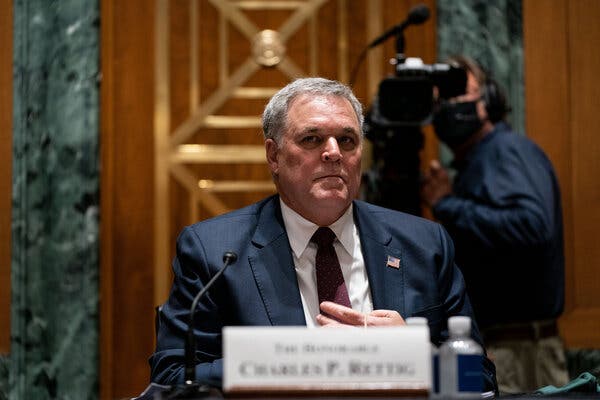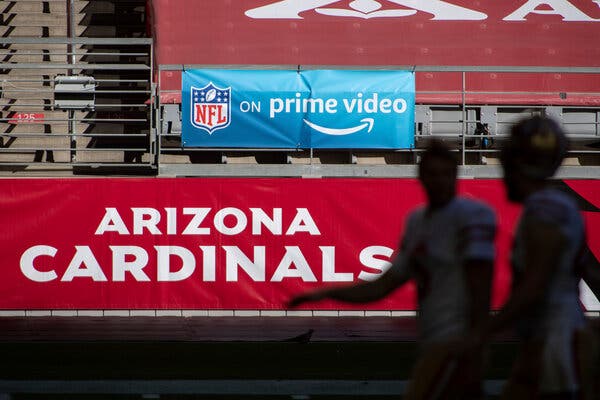The Bank of Japan said on Friday that it would scrap its annual minimum target for equity fund purchases, a decision that comes as Japan’s stock markets hit levels unseen since the collapse of the country’s economic bubble in the early 1990s.
The decision was announced as part of a three-month policy review meant to give the central bank more flexibility to address the economic effects of the coronavirus pandemic.
Under its previous policy, the bank aimed to invest around $55 billion annually in exchange-traded funds — baskets of equities that can be bought and sold on the stock market. That was part of a policy of monetary easing intended to stimulate inflation to combat sagging prices, which sap corporate profits.
Since 2010, when the purchases began, the bank has become Japan’s single largest stockholder. Share prices are now at their highest point in over three decades. The decision on Friday will give the bank the flexibility to make future purchases at more favorable prices. It will also help to address concerns that the program has distorted Japanese stock markets.
The bank will continue to invest in equities that track Japan’s Topix stock index “as necessary,” it said. It will maintain the upper limit of $110 billion in purchases per year that was set earlier in the pandemic, as part of emergency measures to stimulate the economy.
The bank also said that it would maintain its current interest rate targets while allowing long-term rates slightly more room to breathe, increasing the band to 0.25 percent from 0.2 percent.

Taxpayers who already filed their 2020 returns should not amend them to take advantage of tax breaks that were created by the new $1.9 trillion pandemic relief legislation, the Internal Revenue Service commissioner, Charles Rettig, told lawmakers on Thursday, saying that the I.R.S. would automatically send refunds to those who qualify.
Mr. Rettig, speaking at a congressional hearing, was referring to a provision in the law that provides a tax exemption on the first $10,200 of jobless benefits collected in 2020 by unemployed workers whose households earned less than $150,000.
“We believe that we will be able to automatically issue refunds associated with the $10,200,” Mr. Rettig said.
According to The Century Foundation, about 40 million Americans received unemployment insurance last year.
The tax changes included in the most recent stimulus bill passed earlier this month, along with tax changes in the December aid package and the rush to disburse economic impact payments, have put severe pressure on the I.R.S. The agency said on Wednesday that Tax Day would be pushed back by a month, from April 15 to May 17, to give itself and taxpayers more time to handle returns and refunds.
The Treasury Department and the I.R.S. are also racing to develop new regulations and update systems to reflect other aspects of the March relief law.
Treasury officials said at a briefing on Thursday that they are working with the I.R.S. to develop a new online portal to disburse advance payments for the expanded Child Tax Credit, which will provide up to $3,600 per child under age 6 and $3,000 for children ages 6 to 17, regardless of whether a family earns enough to pay income taxes.
The portal will allow taxpayers to upload relevant data for midyear payment adjustments, such as the birth of a child, the officials said.
Treasury officials also said the department is working on additional guidance on how states can use money included in the relief law. That will include clarity about how states must repay relief funds if they decide to cut taxes after receiving aid.
Government workers have been particularly hit hard by the pandemic. Nearly 1.4 million of the 9.5 million jobs that have disappeared over the past year came from state and local work forces.
State and local government positions account for about 13 percent of the nation’s jobs, and the sector has historically been more welcoming for women and African-Americans, offering an entryway into the middle class.
But a report from GovernmentJobs.com, a recruiting site for public sector jobs, suggests that even in this corner of the economy, applicants who are not white males can be at a disadvantage.
The study, which analyzed more than 16 million applicants by race, ethnicity and gender in 2018 and 2019, found that among candidates deemed qualified for a job in city, county or state government, Black women are 58 percent less likely to be hired than white men. Over all, qualified women were 27 percent less likely to be hired than qualified men.
The disparity was surprising. In a survey of 2,700 applicants, nearly a third said they thought they were more likely to be discriminated against in the private sector than in the public. Black Americans, who make up 13 percent of the population, rely disproportionately on state and local government jobs, making up 28 percent of the applicants for positions.
There are steps that could mitigate bias. The study found that many more Black women were called in for interviews when all personally identifying information was withheld during the application screening process — so recruiters did not know a candidate’s name, race and gender. Using a standardized rubric with specific guidelines for each score also sizably increased the number of Black women called in.
Penisha Richardson, who is 35 and lives in Newport News, Va., is a specialist in technical support at a company making printers and copiers. She remembers that when she was looking for jobs — in the public and private sectors — she got many more responses when she listed her name as Penny instead of Penisha.
“I had one person tell me I should go by Penny because it’s easier to pronounce,” Ms. Richardson said.
-
Alexi McCammond, who made her name as a politics reporter at the Washington news site Axios, had planned to start as the editor in chief of Teen Vogue next Wednesday. Now, after Teen Vogue staff members publicly condemned racist and homophobic tweets Ms. McCammond had posted a decade ago, she has resigned from the job. Condé Nast, Teen Vogue’s publisher, announced the abrupt turn on Thursday in an internal email that was sent amid pressure from the publication’s staff, readers and at least two advertisers, just two weeks after the company had appointed her to the position.
-
China’s internet regulator rebuked LinkedIn executives this month for failing to control political content, according to three people briefed on the matter. Though it isn’t clear precisely what material got the company into trouble, the regulator said it had found objectionable posts circulating in the period around an annual meeting of China’s lawmakers, said these people, who asked for anonymity because the issue isn’t public. As a punishment, the people said, officials are requiring LinkedIn to perform a self-evaluation and offer a report to the country’s internet regulator. The service was also forced to suspend new sign-ups of users inside China for 30 days, one of the people added, though that period could change depending on the administration’s judgment. LinkedIn has been the lone major American social network allowed to operate in China.

The N.F.L. signed new media rights agreements with CBS, NBC, Fox, ESPN and Amazon collectively worth about $110 billion over 11 years, nearly doubling the value of its previous contracts, Ken Belson and Kevin Draper report for The New York Times.
CBS, Fox and NBC will pay more than $2 billion each to hold onto their slots, with NBC paying slightly less than CBS and Fox, according to four people familiar with the agreements who requested anonymity because they were not authorized by the N.F.L. to speak publicly about the deals. ESPN will pay about $2.7 billion a year to continue airing Monday Night Football, but also to be added into the rotation to broadcast the Super Bowl beginning in 2026. The agreement with ESPN starts one year earlier, in 2022, because its current contract expires one year earlier than the others.
Each of the broadcasters’ deals include agreements for their respective streaming platforms, while Amazon will show Thursday night games on its Amazon Prime Video service.
“Over the last five years, we started the migration to streaming. Our fans want this option, and the league understands that streaming is the future,” said Robert K. Kraft, owner of the New England Patriots and chairman of the N.F.L.’s media committee.
The N.F.L. has not yet announced who will broadcast Sunday Ticket, a subscription service that lets fans watch out-of-market weekend games that are not broadcast nationally. DirecTV has the rights to that service through 2022.
The contracts also set the stage for the league’s owners to make good on plans to expand the regular season to include a 17th game. It will be the first major expansion to the N.F.L. season in more than four decades, when teams began playing 16 games, up from 14, in 1978.






